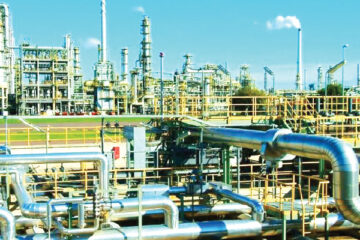In the matter of Dangote Refinery vs NNPC [OPINION]

Dangote
By Simon Kolawole
The Dangote Petroleum Refinery was supposed to be the final solution to Nigeria’s energy needs. What went wrong? Why the brouhaha? Why the anti-climax? I have been observing developments from my balcony — beyond what I have been seeing in the papers, watching on TV, hearing on radio and reading on social media. I could see two major camps in the pandemonium — one painting the picture of a conspiracy to sabotage the refinery so that the “cabals” can continue to feed fat on the nation; the other casting Dangote as the monopolist who is scheming to control the downstream sector same way he sits like a goliath on top of the cement industry. I will now share my thoughts.
Ordinarily, the Dangote refinery should be a thing of joy, a national pride — something Mr Femi Otedola, Alhaji Aliko Dangote’s bosom friend, calls the “eighth wonder of the world”. According to the information on its site, the 650,000 barrels per day (bpd) plant is “Africa’s biggest oil refinery and the world’s biggest single-train facility”; its pipeline infrastructure “is the largest anywhere in the world, with 1,100 kilometres to handle 3 billion standard cubic foot of gas per day”; it has a 435mw power plant which “can meet the total power requirement of Ibadan DisCo”; and its refined products can meet all of Nigeria’s needs, with spare to export. What is there not to love about the refinery?
Well, the devil is always in the detail. Otherwise, why should there be controversy in place of carnival? Before I proceed, let me state that I am not here to join the bandwagon of protagonists and antagonists. I have been around long enough to know that things are not always the way they appear. Forgive me, therefore, if this article fails to add more spice to the drama. For me, the Dangote situation offers us yet another opportunity to rethink the story of this country as we keep racing aggressively in the wrong direction. Nigeria cannot develop this way. The brouhaha stems from the fact that our oil sector has been grossly mismanaged for decades. And it is very depressing.
Shorn of the drama, the three burning issues are: supply of crude oil, off-taking of products and retail pricing. The Dangote refinery wants to be given preference in the sale of crude oil produced in Nigeria, which the Organization of Oil Exporting Countries (OPEC) reported as 1.35m bpd in August 2024. After all, the refinery’s capacity is 650,000 bpd, so why should it have any problems sourcing crude locally? Dangote also wants fuel importers and marketers to be asked to patronise the refinery’s products. Again, this seems simple: why import what is available at home? Finally, at what price should the products from Dangote be dispensed at the pumps? These are the key issues.
Here we go. On crude availability, it is a very sad story. With my modest knowledge of the oil industry, I can say that NNPC Ltd’s share of Nigeria’s reported production of 1.35mbpd is not up to 650,000 bpd. When the national oil company was still publishing monthly reports years ago, there were months when its total share was about 150,000 bpd. Things have slightly improved. According to a recent report by The Economist Intelligence Unit (EIU), it has gone up to just over 200,000 bpd. I think the figure should be higher than that now, but for practical purposes, I still do not think NNPC is in a position to meet Dangote’s needs all by itself. Some form of reshuffling will have to be done.
Why is NNPC’s share so low? There are at least two reasons: (1) a sharp decline in onshore production as a result of decades of insecurity and low investment (2) our crude arrangements to pay for the importation of petrol and service foreign loans. We do not have all the information on these pledges, but at least we know that the loan arranged by Afrexim Bank costs us around 90,000 bpd in repayment. I believe this is taken from the federation’s share of oil production. Therefore, if what we are getting from our production is not significant enough — with a chunk already pledged to creditors and other commitments — where will NNPC get the 650,000 bpd that Dangote needs?
A quick option is for the oil majors to be compelled to sell to Dangote: section 109 of the Petroleum Industry Act (PIA) stipulates that local refineries be given priority for crude sale before exports. It is called domestic crude supply obligation (DCSO). This is feasible but slightly complicated. The majors have long-term commercial commitments abroad which they will have to breach, and this could have legal implications. But most importantly, when oil companies export their crude, they earn forex — some (no matter how little) of which they repatriate, thereby improving dollar inflow into the economy. In any case, NUPRC has clarified that DCSO works on a willing buyer, willing seller basis.
If the oil majors sell to Dangote in dollars, that would be fine for the naira — but it means Dangote will have to source FX to pay. Even if all that the refinery is buying for now is 400,000 bpd, that is a lot of money. At the current price of $72/barrel, that is roughly $28 million daily and about $864 million monthly. If we scale it to its 650,000 bpd capacity, that is $46.8 million daily and $1.4 billion monthly. That is quite an FX requirement. If they sell to Dangote in naira, where will they get the FX to finance their own obligations and run operations? Clearly, there is a trade-off for every option. I seriously doubt that the federal government will trade off FX inflow for the sake of the DCSO provision.
The federal government recently announced that NNPC would start supplying Dangote about 385,000 bpd from October 1. That is good news — if NNPC has up to that to give. To the question: why is Nigeria’s share of oil production so low? When militants started attacking oil pipelines in 2006, little did it occur to us that the consequences would ruin the economy someday. Most of Nigeria’s oil production used to be onshore under the joint venture (JV) partnerships with international oil companies. Nigeria owns 55-60 percent equity of the JV projects. This means we will fund a JV project to the tune of 55-60 percent and — in turn — get 55-60 percent share of oil production.
In 2001, we were getting 1.2m bpd from JV production alone. Today, we are getting 200,000 bpd overall. The sad story of Nigeria. From our share, NNPC used to set aside 445,000 barrels daily as “domestic crude” for its refineries and export the rest on behalf of the federation. We had plenty oil to play with. NNPC was remitting between $3 billion and $4 billion from exports every blessed month as oil prices soared frequently — at a point hitting the all-time high of $147/barrel. We could meet every FX demand without blinking. The nouveau riche were buying private jets like bottled water. The naira was stable for a long period, only suffering minor depreciations as a result of lower oil prices.
Unfortunately, insecurity crippled onshore production. To worsen matters, the Petroleum Industry Bill (PIB), introduced to the National Assembly in 2008 by President Umaru Musa Yar’Adua, was busy gathering dust owing to unseriousness on the part of everybody, particularly the lawmakers. Unsure of what laws would govern their investments, the oil majors withheld their money. Years were wasted. The law was not passed until 2021, by which time the world had left us behind. Now, we are paying the price. Offshore production became more attractive to the oil majors because although it is more capital-expensive, the incentives were generous and they never had to worry about insecurity.
Nigeria is so upside down that when crude oil prices went past $100/barrel in the wake of the Russian invasion of Ukraine in 2022, we did not benefit much because we did not have enough oil to export. In the past, we were having huge windfalls. Under Presidents Olusegun Obasanjo and Yar’Adua, we built our excess crude account to over $22 billion from windfalls. But with insecurity and low investments in the upstream sector, our production had gone down. We were producing 2.2m bpd steadily in the 2000s but today we are struggling with around 1.3m. That is even better: in 2016, we went below 1m bpd. If this reversal of fortune does not make us sober, nothing else will.
The second issue is Dangote’s desire that fuel importers and marketers be directed to patronise the refinery. Fair enough. If they are getting a better deal from Dangote, why not? It should be a simple business decision. But from the pricing template released by the NNPC after the refinery sold its first petrol a week ago, it appears Dangote is priced higher than or similar to imported petrol. NNPC said it bought at N842.61/litre from Dangote and added all the levies, taking the pump price to N950.22/litre in Lagos — compared to the going price of N855, although NNPC used N1,637.59/$ as the FX rate as against the official average of N1,594. Still, the math was not “mathing” to me.
Dangote denied selling to NNPC at N842.61/litre but, noticeably, did not disclose the price. My sense is that since Dangote imported its crude at a higher cost, its petrol price will be high. More so, it is when a refinery achieves economies of scale that its pricing can become competitive. I hope when Dangote begins to buy crude in naira — as announced by the government last week — its FX exposure will reduce. It can then begin to price its products more competitively. By the way, I am not saying Dangote petrol will sell for N200/litre as some have been fantasising. I don’t know who came up with the theory that Dangote will produce “cheap petrol” because there is no “landing cost”.
And that takes us to the third issue: pricing. We have to manage our expectations. As I explained in a recent article, the biggest cost input is the price of crude oil, not shipping. Shipping costs are negligible. If crude prices are high, product prices will be high too. If crude prices fall to $50/barrel today, the prices of products will drop significantly, assuming the naira does not fall further. In the interim, even if Dangote buys oil in naira, it will still be at the prevailing international price. We need to be guided. That is why I see the Dangote vs NNPC media war as a distraction: things are more nuanced than they appear. When the dust settles, we will still have to address these burning issues.
Culled from TheCable











